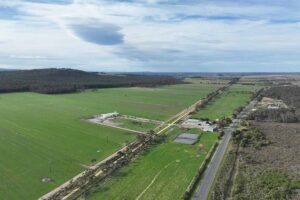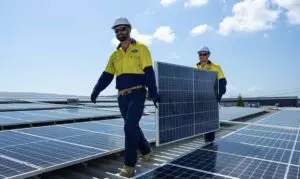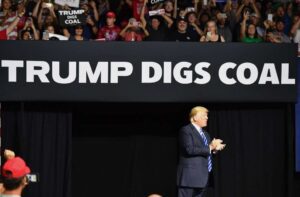As the end of the Parliamentary year draws to a close, and we mark the Coalition’s first few months in power, I thought it would be useful to provide a comprehensive list of climate change and science policy decisions since the election.
Agency consolidation
Further stripping back of the previous Department of Climate Change: Shifting the climate change programs into the Department of the Environment and the Department of Resources and Energy is set to save $45 million.
$435 million cut from the Australian Renewable Energy Agency (ARENA): A 14.5% trim from ARENA’s budget and confirmation of Labor’s 2013 deferral of $370 million beyond 2020. Although Industry Minister Ian Macfarlane has committed to the agency, the cut will affect ARENA’s ability to fund and support research and development of renewable energy projects.
Clean Energy Finance Corporation (CEFC) slated to be abolished: A bill to abolish the CEFC is before parliament. The CEFC – as Frank Jotzo recently put it here on The Conversation – “is charged with making co-investments in renewable energy and energy efficiency projects in the commercial sector.”
Deciding to abolish the corporation stifles a $10 billion mandate to invest and develop the commercialisation of “Australian-based renewable energy, low emissions and energy efficiency technologies, thus preparing and positioning the Australian economy and industry for a carbon constrained world.”.
Review of the Renewable Energy Target announced: The Renewable Energy Target, currently set at 20% by 2020, is a key support for innovation and investment in the renewable energy sector. It has driven $19 billion in clean energy investment since 2001. A decrease in the target again would influence further development and investment.

$349 million redirected from the Carbon Capture and Storage Flagships program (CCS Flagships): CCS Flagships funds large-scale integrated carbon capture and storage projects. Australia has widely been seen as a driver of innovation and research in this space given our status as a major producer and exporter of fossil fuels. The funding cuts will reduce investment in commercialisation of these technologies.
$42 million cut from the National Low Emissions Coal Initiative (NLECI): This initiative was established to aid development and deployment of low emissions coal technologies. Cuts will reduce the scope for future development for emissions reductions in this area.
Suspended the National CO2 Infrastructure Plan (NCI Plan) saving $13 million: This suspends identification of carbon capture and storage sites.
Taking advice in-house
Plan to abolish the Climate Change Authority (CCA): As stated in the abolition bill currently before parliament, the Coalition, “has a long standing commitment to abolish the CCA because it is not needed”. The government will instead receive climate advice from the Bureau of Meteorology (BOM) and CSIRO.
However the CCA’s net is wider than just providing advice to government. Frank Jotzo argued that, “Axing the Authority would be the most severe blow to Australia’s climate change policy institutions. Even if the carbon price was repealed, the authority has an important role. It has to advise on Australia’s national emissions target, and provide deep and critical analysis on any policy aimed at cutting emissions.”
Abolished the Climate Commission: The Climate Commission was established to provide independent reporting and communication of climate science and economics. The decision saved the budget $580,000 this financial year and $1.6 million per year in running costs.
Representation
No climate change minister or science minister Abbott’s ministry is the first since 1931 to go it without a science minister, with the majority of responsibility appearing to fall on Minister for Industry Ian MacFarlane. There is speculation over what exactly the decisions will mean for representation for science and climate change.
Downgrading representation at the annual UN climate change talks in Warsaw: Environment Minister Greg Hunt and Foreign Minister Julie Bishop both stayed home, as Minister Hunt was prioritising repealing the carbon tax. Australia was represented by Climate Change Ambassador, Justin Lee.

Sacking department secretaries: The incoming government sacked the Secretary of the Department of Climate Change, Blair Comley and Secretary of the Innovation, Industry, Science and Research Don Russell.
Emissions targets
Sticking to 5% emissions reduction target by 2020: Tony Abbott said:
Australia will meet our 5% emissions reduction target, but this government has made no commitments to go further than that. We certainly are in no way looking to make further binding commitments in the absence of very serious like binding commitments from other countries, and there is no evidence of that.”
The Climate Change Authority has advised the government that a 5% emissions reduction target is “not a credible option” and will leave Australia “lagging behind” other countries.
Policy
Initiating repeal of the carbon tax package: If the repeal of the carbon tax goes ahead, it will give Australia the inauspicious title of the first country to abolish a carbon market. This decision goes against an overwhelming majority of economists backing carbon pricing as opposed to the Coalition’s Direct Action plan.
With the Direct Action Plan Green Paper due this month, and the White Paper due in March, all eyes are understandably on the devil in the detail.
Announced a $1.55 billion Emissions Reduction Fund for Direct Action: Earmarked as a central element of the Coalition’s Direct Action plan, so far detail on the Emissions Reduction Fund is scarce. Public consultation closed in November with the final policy design set to be released early 2014. However two core components are clear:
Through the Fund, the Government will purchase low-cost abatement through reverse auctions – an ‘abatement buy-back’.
The Fund will provide incentives for abatement activities across the Australian economy and work in conjunction with the Carbon Farming Initiative.”
Announced plan to build a 15,000 strong “green army”: The Abbott government is recycling the Howard government’s “green corps” policy to complement the Coalition Direct Action Plan with emissions reduction through tree planting and revegetation.
Announced $9 million to the National Climate Change Adaptation Facility (NCCARF): NCCARF coordinate, generate and communicate climate change adaptation research. The Coalition support ensures programs continue to run for the next three years.
Luke Menzies received funding from from The Department of Innovation, Industry, Science and Research Science Connections Program (SCOPE).
![]()
This article was originally published at The Conversation.
Read the original article.







